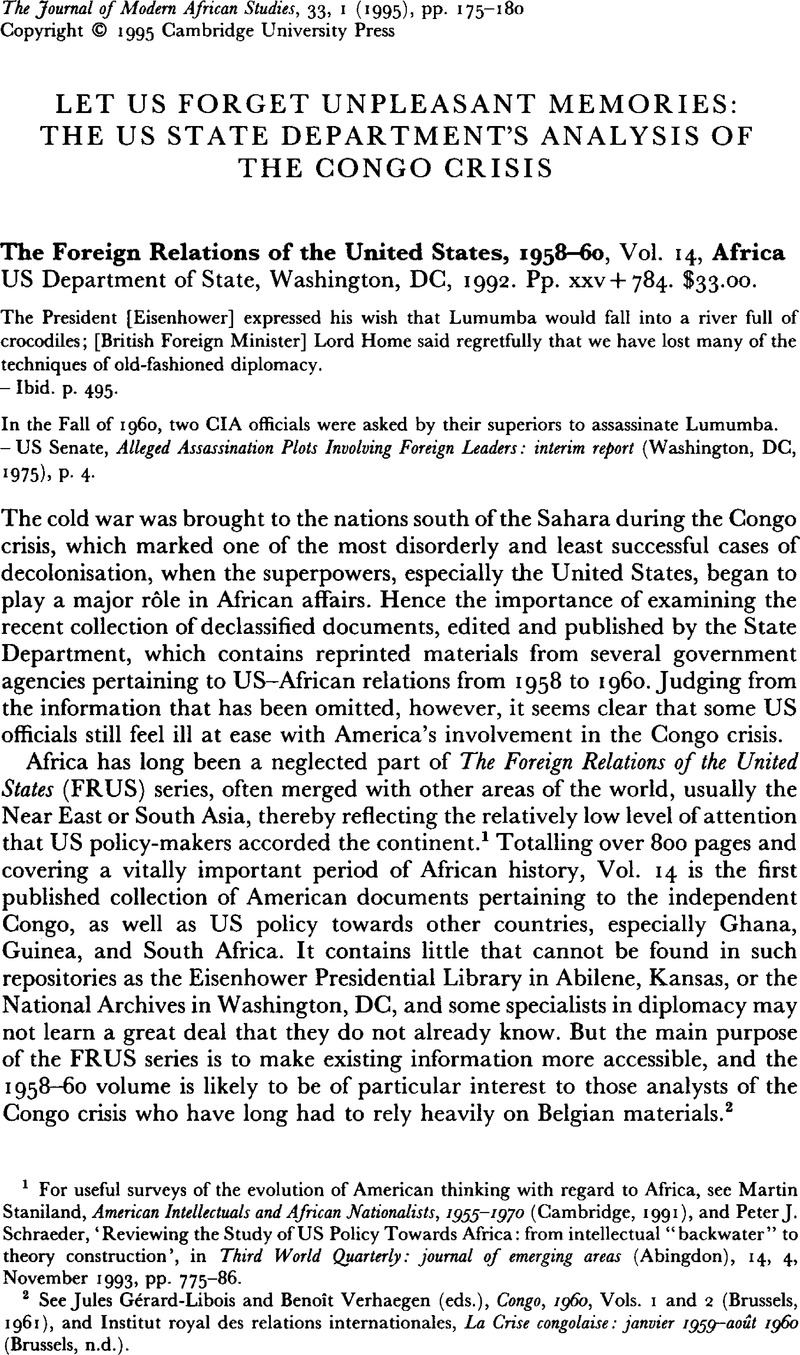Published online by Cambridge University Press: 11 November 2008

1 For useful surveys of the evolution of American thinking with regard to Africa, see Staniland, Martin, American Intellectuals and African Nationalists, 1955–1970 (Cambridge, 1991),CrossRefGoogle Scholar and Schraeder, Peter J., ‘Reviewing the Study of US Policy Towards Africa: from intellectual “backwater” to theory construction’, in Third World Quarterly: journal of emerging areas (Abingdon), 14, 4, 11 1993, pp. 775–86.Google Scholar
2 See Gérard-Libois, Jules and Verhaegan, Benoît (eds.), Congo, 1960, Vols. 1 and 2 (Brussels, 1961),Google Scholar and Institut royal des relations internationales, La Crise congolaise: janvier 1959–août 1960 (Brussels, n.d.).Google Scholar
3 American Library Association, Less Access to Less Information By and About the U.S. Government: a 1981–1987 chronology (Washington, DC, 1988);Google ScholarFeinberg, Lotte E., ‘Managing the Freedom of Information Act and Federal Information Policy: the Reagan years’ in Government Information Quarterly (Greenwich, CT), 6, 4, 1989, pp. 345–64;Google Scholar and Frederick M. Kaiser, ‘The Amount of Classified Information: causes, consequences, and correctives of a growing concern’, in ibid. 6, 3, 1989, pp. 247–66. On the theoretical significance of secrecy, see Gibbs, David N., ‘Secrecy and International Relations’, in Journal of Peace Reseach (London), 32, 3, 1995.Google Scholar
4 See US Senate, op. cit. 1975, ch. 3.
5 Ibid. p. 256. A similar conclusion is reached by Gleijeses, Piero, ‘“Flee! The White Giants are Coming”: the United States, the Mercenaries, and the Congo, 1964–65’, in Diplomatic History (Wilmington, DE), 18, 2, 1994, p. 209.Google Scholar
6 Weissman, Stephen R., American Foreign Policy in the Congo, 1960–1964 (Ithaca and London, 1974), pp. 88–99.Google Scholar
7 Regarding CIA support for Mobutu, see Dayal, Rejashwar, Mission for Hammarskjöld (Delhi, 1976), p. 66;Google ScholarKalb, Madeleine, The Congo Cables: the cold war in Africa from Eisenhower to Kennedy (New York, 1982), p. 96;Google ScholarLemarchand, René, ‘The C.I.A. in Africa: How Central? How Intelligent?’, in The Journal of Modern African Studies (Cambridge), 14, 3, 09 1976, p. 413;Google Scholar and Weissman, op. cit. p. 95.
8 Mahoney, Richard, JFK: ordeal in Africa (New York, 1983), p. 71;Google ScholarMinter, William, ‘The Limits of Liberal Africa Policy: lessons from the Congo crisis’, in TransAfrica Forum (New Brunswick), 2, 3, 1984, pp. 33–4;Google ScholarSchatsberg, Michael G., Mobutu or Chaos? (Lanham, MD, 1991), pp. 21–26;Google Scholar and Kalb, op. cit. p. 189.
9 However, the preface to the FRUS volume discusses records of the Senate investigation and includes this (rather non-committal) comment: ‘These records did not, however, include material concerning the planning and preparation for the possible assassination of Patrice Lumumba described in the Interim Report of the Senate Select Committee on Intelligence, which was based on interviews and on CIA documents that the Agency had made available to the Committee’ (p. vii).
10 US Senate, op. cit. 1975, p. 20.
11 According to Kelly, Sean, America's Tyrant. The CIA and Mobutu of Zaïre (Washington, DC, 1993), p. 57, ‘Victor Hedgeman’ is actually a pseudonym for Lawrence Devlin, who gained considerable notoriety for his rôle in Congo covert operations.Google Scholar
12 US Senate, op. cit. 1975, p. 24. Note that both ellipses were in the original.
13 Ibid. p. 13.
14 Ibid. p. 263.
15 See panel discussion by Colby, William and Stockwell, John et al., ‘Should the U.S. Fight Secret Wars?’, in Harpers (New York), 09 1984, p. 36.Google Scholar
16 Numerous studies document US intervention in the Congo: Weissman, op. cit. 1974; Lemarchand, loc. cit. 1976; Weissman, Stephen R., ‘CIA Covert Action in Zaire and Angola: patterns and consequence’, in Political Science Quarterly (New York), 94, 2, 1979, pp. 263–86;Google Scholar Kalb, op. cit. 1982; Mahoney, op. cit. 1983; Ekpebu, L.B., Zaire and the African Revolution (Ibadan, 1989);Google Scholar Schatzberg, op. cit. 1991; Gibbs, David N.The political Economy of Third World Intervention: mines, money, and U.S. policy in the Congo crisis (Chicago, 1991);Google Scholar Kelly, op. cit. 1993; and Schraeder, Peter J., United States Foreign Policy Toward Africa: incrementalism, crisis and change (Cambridge, 1994), ch. 3.CrossRefGoogle Scholar
17 For new evidence on UN involvement in the Congo, see Collins, Carole, ‘Fatally Flawed Mediation: Cordier and the Congo crisis of 1960’, in Africa Today (Denver), 39, 3, 1992, pp. 5–22.Google Scholar
18 Early studies of the Congo viewed anti-communism as virtually the sole objective of US foreign policy. See, for example, Lefever, Ernest W., Crisis in the Congo: a United Nations force in action (Washington, DC, 1965)Google Scholar and Young, Crawford, Politics in the Congo: decolonization and independence (Princeton, 1965). However, later studies accepted that other motives, including economic interests, may have been influential as well.CrossRefGoogle Scholar
19 Gibbs, op. cit. pp. 94–5 and 99–100.
20 Weissman, op. cit. pp. 88–99.
21 Freud, Sigmund, A General Introduction to Psychoanalysis (New York, 1975 edn), p. 146.Google Scholar
22 It should be noted that the criticised omissions in Vol. 14 are part of a larger problem with the State Department's historical project more generally. See Kuniholm, Bruce and Dingaman, Roger, ‘Historians Say Secrecy Distorts Foreign Policy Chronicle’, in The Washington Post, 16 April 1990, and Warren Cohen, ‘At the State Dept., Historygate’, in The New York Times, 8 May 1990.Google Scholar